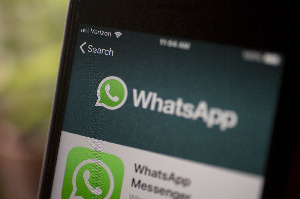The World Health Organization plans to reach at least 50 million people with a WhatsApp information service that delivers information on demand about the coronavirus and is so successful in South Africa it will be used around the world.
The free service, the first of its kind launched globally by the WHO, garnered 10 million users within three days of its March 20 launch. It employs artificial intelligence to offer information on topics ranging from symptoms of the disease and where to get tested to debunking myths about it.
As the pandemic spreads in Europe and the U.S., the WHO is stepping up efforts to speak directly to citizens around the world. While information may be less readily available in regions such as Africa, Southeast Asia and Central America, many people have mobile phones. Social media can circumvent government communications that may be inadequate because of a lack of resources or political considerations, said Andy Pattison, manager of digital solutions at the WHO in Geneva.
“We want to give everyone a democratization of health messages,” he said by phone. “More messages to more channels to more people, that’s what we are trying to do. The coronavirus has just acted as a catalyst to get a lot more things done quickly.”
The organization will work together with Praekelt.org, a non-profit company that developed the service in South Africa, where it now has 2.6 million users. That company was introduced to the WHO by WhatsApp, which is owned by Facebook Inc.
“I am exhausted but very excited, I think it’s very important,” said Gustav Praekelt, the founder of Praekelt.org. “What we will see is the largest global messaging campaign” ever, he said.
A discussion between Mark Zuckerberg, the chief executive officer and co-founder of Facebook, and Tedros Adhanom Ghebreyesus, WHO’s director general, paved the way for the launch, said Pattison. There are plans to start the service on other messaging apps such as Rakuten Inc’s Viber, which is popular in eastern Europe.
In English for now, the service will be launched in Arabic and Spanish this week and is expected to be made available in more than 20 languages, including Italian, Farsi and Kiswahili.
“We have just seen an such an exponential growth — when we roll out the languages it’s going to be extraordinary,” said Pattison.
Source: Thepressradio.com|Ghanaian Media in SA
 Home Of Ghana News Ghana News, Entertainment And More
Home Of Ghana News Ghana News, Entertainment And More





